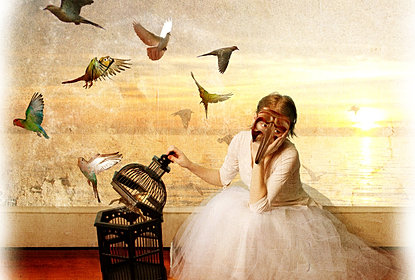“The bird that would soar above the level plain of tradition and prejudice must have strong wings. It is a sad spectacle to see the weaklings bruised, exhausted, fluttering back to earth.”
These are probably the most beautiful lines of Kate Chopin's novel The Awakening.
So I'm going to approach this novel very differently from the first two. I have fewer opinions and less analysis. This is because of a few things:
1. I found Edna's character entirely unengaging.
2. I ardently disagreed with Edna's actions in response to her awakening.
3. Regardless, this novel deserves thought and discussion because the message and experience cannot be ignored.
When The Awakening was first published in 1899 it was not received well. It avoided a direct ban but was heavily censored due to Edna's choices which aggravated the established gender roles in society as well as exposed the very real existence of female sexuality. In short, our little, listless, Laodicean Edna created quite a stir with her emotional, mental, and physical abandonment of her husband, her occasional indifference to her children, her scandalous sexual liaison with Arobin, and her emotional infidelity with Robert Lebrun. The last of which resulted in her suicide.
So what was the message? That female nonconformity results in unrest, unhappiness, and drowning in the Gulf of Mexico? Well, I suppose that's one take away, but certainly not the one Kate Chopin intended. Instead, this novel is heralded as one of the first truly feminist novels. This means the message lies within Edna's secretively common experience, making her the victim of an existence smothered by societal expectations.
Before I continue with the alternative format I want to create some quick parallels in the novel's characterizations. So Edna is obviously the main figure, originally an ideal woman, wife, and mother who then awakens with life, passion, longing, and dissatisfaction. Mademoiselle Reisz is a recitalist who deeply touches Edna. Though isolated and often unpleasant, Mademoiselle Reisz is independent, perhaps even a representation of Edna's desire to be so as well. Adele Ratignolle is a doting and devoted wife and mother who gives consistent warning to Edna as well as Robert. She may also represent what women were expected to be: the ideal mother and wife who found fulfillment in others fulfillment. Robert is obviously the catalyst to Edna's awakening, and he also serves as the face to the qualities she sees lacking in her marriage. Whereas Arobin seems to be Edna's form of expression and rebellion.
Okay. I have selected some of my favorite quotes from the novel. (If there is one thing about this book it would have to be its style. It is written beautifully.) I will also offer some questions which will hopefully allow us all to ponder the messages behind Edna's awakening.
- What necessitated the dual life for Edna? Was it expectation, propriety, class, etc?
- Does our current society necessitate a dual life?
 | ||
"He could see plainly that she was not herself. That is, he could not see that she was becoming herself and daily casting aside that fictitious self which we assume like a garment with which to appear before the world."
|
-Natalie Cherie




